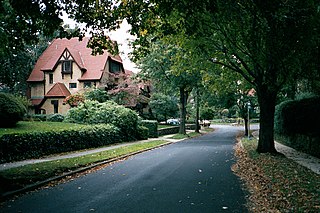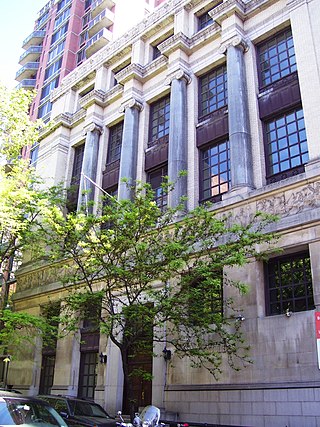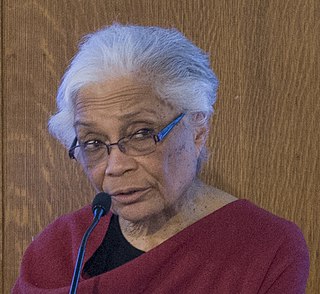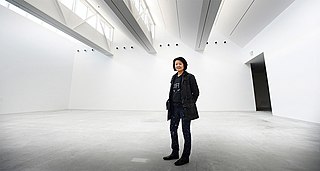Elizabeth (sometimes spelled Elisabeth) Coit FAIA (1892 - 1987) was an American architect. Her career was devoted to housing in the public sector. [1]
Elizabeth (sometimes spelled Elisabeth) Coit FAIA (1892 - 1987) was an American architect. Her career was devoted to housing in the public sector. [1]
Coit was born in Winchester, Massachusetts in 1892. She graduated from Radcliffe College in 1911, attended the School of the Museum of Fine Arts, Boston and received her Bachelor of Architecture from the Massachusetts Institute of Technology in 1919. After graduation, she worked as a drafter, designer, and drafting supervisor at the office of Grosvenor Atterbury, and in 1926, she became a licensed architect in New York State. [2] She began working part-time on her own projects while still employed by Grosvenor Atterbury, and opened her own firm in New York City in 1930, which she ran until 1942. Her office designed houses mainly for women outside of the city and for businesses in the state.
In 1941, she published "Design and Construction of the Dwelling Unit for the Low-Income Family," which was a study about low-income housing in the United States. From 1942 - 1947, she was the technical standards editor for the United States Housing Authority's Public Housing Design in Washington, D.C., followed by a research position at Mayer and Whittersley from 1947 - 1948. In 1948, she became the principal planner for the New York City Housing Authority, where she worked until her retirement in 1962. [3] Even in retirement she continued to serve as an adviser for government and private housing organizations. [4] In 1973, she was elected into the National Academy of Design as an Associate Academician.
Coit contributed to numerous pamphlets about housing, was a book reviewer for the Architectural Record , and in 1968, became the editor for the New York Metropolitan Chapter of the National Association of Housing and Redevelopment Officials. [5] She was the first woman to receive Langley Award from the American Institute of Architects (AIA). She was elected as a Fellow of the AIA in 1955, and received a Pioneer in Architecture from the New York Chapter of the AIA in 1969. [4]
Some of her buildings are: [5]
Some of her writings are: [5]

The American Institute of Architects (AIA) is a professional organization for architects in the United States. Its headquarters are located in Washington, D.C. The AIA offers education, government advocacy, community redevelopment, and public outreach programs, and collaborates with other stakeholders in the design and construction industries. The current leadership of the AIA includes Lakisha Ann Woods, CAE, serving as EVP/Chief Executive Officer, and Emily Grandstaff-Rice, FAIA, serving as the 2023 AIA President.

Grosvenor Atterbury was an American architect, urban planner and writer. He studied at Yale University, where he was an editor of campus humor magazine The Yale Record After travelling in Europe, he studied architecture at Columbia University and worked in the offices of McKim, Mead & White.

The New York School of Applied Design for Women, established in 1892 by Ellen Dunlap Hopkins, was an early design school for women in New York City. The 1908 New York School of Applied Design building was designed by Harvey Wiley Corbett and is now landmarked.

Sharon Egretta Sutton, is an American architect, educator, visual artist, and author. Her work is focused on community-based participatory research and design. She is a professor emerita at the University of Washington. In 1984, she became the first African American woman to become a full professor in an accredited architectural degree program while teaching at the University of Michigan. She has also taught at Parsons School of Design, and Columbia University.

Beverly Willis is an American architect who played a major role in the development of many architectural concepts and practices that influenced the design of American cities and architecture. Willis' achievements in the development of new technologies in architecture, urban planning, public policy and her leadership activities on behalf of architects are well known. Her best-known built-work is the San Francisco Ballet Building in San Francisco, California. She is the co-founder of the National Building Museum, in Washington, D.C., and founder of the Beverly Willis Architecture Foundation, a non-profit organization working to change the culture for women in the building industry through research and education.

Annabelle Selldorf is a German-born architect and founding principal of Selldorf Architects, a New York City-based architecture practice. She is a fellow of the American Institute of Architects (FAIA) and the recipient of the 2016 AIANY Medal of Honor. Her projects include the Sunset Park Material Recovery Facility, Neue Galerie New York, The Rubell Museum, a renovation of the Sterling and Francine Clark Art Institute, David Zwirner's 20th Street Gallery, The Mwabwindo School, 21 East 12th Street, 200 11th Avenue, 10 Bond Street, and several buildings for the LUMA Foundation's contemporary art center in Arles, France.

Katharine Cotheal Budd (1860–1951) was a pioneering woman architect and author who ran a New York City architectural practice for over three decades. She became a member of the American Institute of Architects in 1924. She obtained an architectural license in Georgia in 1920.

Women in architecture have been documented for many centuries, as professional practitioners, educators and clients. Since architecture became organized as a profession in 1857, the number of women in architecture has been low. At the end of the 19th century, starting in Finland, certain schools of architecture in Europe began to admit women to their programmes of study. In 1980 M. Rosaria Piomelli, born in Italy, became the first woman to hold a deanship of any school of architecture in the United States, as Dean of the City College of New York School of Architecture. In recent years, women have begun to achieve wider recognition within the profession, however, the percentage receiving awards for their work remains low. As of 2023, 11.5% of Pritzker Prize Laureates have been female.

Toshiko Mori is a Japanese architect and the founder and principal of New York-based Toshiko Mori Architect, PLLC and Vision Arc. She is also the Robert P. Hubbard Professor in the Practice of Architecture at the Harvard University Graduate School of Design. In 1995, she became the first female faculty member to receive tenure at the GSD.
Louise Braverman is a New York City-based architect known for a design philosophy that aims to combine aesthetic design and social conscience. She is a Fellow of the American Institute of Architects (FAIA).

Doris Cole,, is an American architect and author. She was a founding principal of Cole and Goyette, Architects and Planners Inc. She is the author of From Tipi to Skyscraper: A History of Women in Architecture. which was the first book on women in architecture in the United States.
Roberta Feldman is an American architect and educator. She holds the title of Professor Emerita at the School of Architecture, University of Illinois Chicago. She has worked with Chicago housing and community organizations to revitalize and preserve low-income neighborhoods.

Eleanore Kendall Pettersen was an American architect. She was one of the first licensed female architects in New Jersey, where she operated a private practice from 1952 to 2002.

Judith Deena Edelman was an American architect. She designed a variety of projects in New York with her firm Edelman Sultan Knox Wood/Architects. A feminist, she was an advocate for the advancement of women in architecture and led the American Institute of Architects' first task force on women.
Susan A. Maxman is an American architect who founded a firm called Susan Maxman Architects in 1985, which she expanded to Susan Maxman & Partners Ltd in 1995. Her firm is associated with a large number of projects involving a wide spectrum of architectural services, including design of old and new buildings, restoration and rehabilitation works, master and site planning, feasibility reports, programming, historic preservation, and interior design. She was the first woman elected as president of the American Institute of Architects in 1992. Her expertise in adoption of the "principles of sustainable design" in her projects has received national appreciation, and in 2011 Maxman was nominated by President Barack Obama to the board of directors of the National Institute of Building Sciences.
African-American architects are those in the architectural profession who are members of the African diaspora in the United States.

Ellamae Ellis League, was an American architect, the fourth woman registered architect in Georgia and "one of Georgia and the South's most prominent female architects." She practiced for over 50 years, 41 of them from her own firm. From a family of architects, she was the first woman elected a Fellow of the American Institute of Architects (FAIA) in Georgia and only the eighth woman nationwide. Several buildings she designed are listed on the National Register of Historic Places (NRHP). In 2016 she was posthumously named a Georgia Woman of Achievement.

Rose Connor was an American architect. Called "one of the earliest and most successful women architects of the 20th century", her architectural work was largely residential projects in Southern California, but she also did work for the U.S. military and Fuller Theological Seminary.
Margaret Burnham Geddes was an American architect, urban planner, and activist who worked in Providence, Rhode Island. She designed several early modernist houses in southern New England with partner J. Peter Geddes and worked as a planner for the Providence Redevelopment Agency.
{{cite book}}: CS1 maint: others (link){{cite book}}: CS1 maint: others (link){{cite book}}: CS1 maint: others (link)